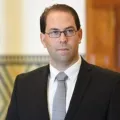Shifting Geoeconomics and National Development in the GCC States
Dr. Youssef Chahed, former Prime Minister of Tunisia (2016-2020), and Adel Hamaizia will convene a unique series of discussions about the shifting geoeconomics in the GCC states and how countries are working to develop, diversify, digitalize, and decarbonize their economies. The group will examine how infrastructure initiatives, technological changes, and the energy transition are creating new partnership opportunities between the Gulf, the US, the EU, China and other BRICS(+). It will investigate how GCC countries are adapting their development plans to achieve their policy objectives.
The Study Group will culminate in a Policy Lab exercise in which participants will generate policy recommendations on how the GCC states should navigate geoeconomic change and advance their national development efforts. A summary of the recommendations will be sent to relevant senior policy officials within the US and GCC Governments, as well as at multilateral organizations.
Format: Sessions will include a lecture component, and a (panel) discussion with experienced practitioners and leaders from government, private sector, think tanks, and multilateral organizations. Participants will be expected to come prepared to ask informed questions to the guest speakers and engage in discussion. In all study group sessions, the Chatham House rule will apply unless indicated otherwise. Refreshments will be provided.
Schedule: The study group will consist of 7 sessions on Wednesday afternoons from 4:30 – 6:00pm.
March 12: Shifting Geoeconomics in the GCC states: How are GCC countries navigating changing international trade routes (e,g. BRI, IMEC), investment, and partnerships to achieve their international objectives? How are GCC countries deploying economic statecraft to achieve these objectives?
March 26: National Vision Programs (e.g. Saudi Arabia’s Vision 2030, We the UAE 2031, Qatar National Vision 2030, Bahrain Vision 2030, Kuwait’s Vision 2035, Oman’s Vision 2040), and development strategies: How are the GCC states’ economic reform efforts progressing and what barriers remain? Which sectors are leading the way? And how is competition managed?
April 2: Energy Transition vs. Energy Security: How is the role of GCC states evolving in the global energy landscape? What contributions are they making to climate policy and financing? To what extent will global decarbonization impact the GCC states' international influence? How might the new Trump administration affect OPEC+ and global energy markets? Do GCC states play a pivotal role in the critical minerals sector?
- Guest Speaker: Eng. Suliman Almazroua, CEO, National Industrial Development and Logistics Program (NIDLP)
- Guest Speaker: Dr. Sara Vakhshouri, Founder and President, SVB Energy International; Professor and Chair of the IWP Center for Energy Security and Diplomacy; Adjunct Professor at Georgetown University
April 9: Doing Business in the GCC states – from Financial Centers to Freezones and beyond: What are the key opportunities and challenges shaping trade and private sector growth in the region? Do Financial Centers and Freezones spur growth? How are GCC countries enhancing their regional and global competitiveness? What is the evolving role of state-owned enterprises (SOEs) and family businesses in driving economic development?
April 16: Sovereign Wealth Funds – between national development and economic statecraft: How is the $4 trillion being allocated and managed? Should SWFs create national champions? What do trade-offs look like between returns, national development, and intergenerational equity?
April 23: Tech, Finance, and Entrepreneurship: What do the varieties of finance and financing look like for business (from venture capital to equity markets)? How are the GCC states scaling innovative technologies both domestically and internationally? What are the domestic challenges to innovation and can the GCC states become global leaders on AI and technology?
April 30: Policy Lab: Concluding session in which participants will generate policy recommendations on the GCC states’ geoeconomics and national development efforts.
Main Point of Contact: Please reach out to Dr. Youssef Chahed's Research Assistant, Peter Reid, with any questions related to the study group material or meeting time at: peterreid@hks.harvard.edu





